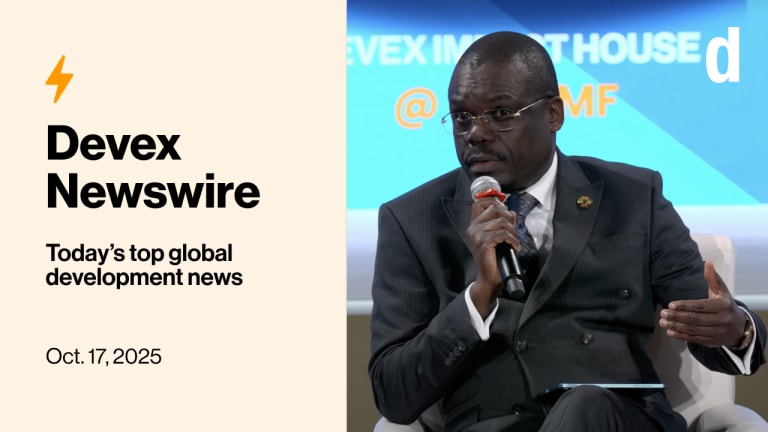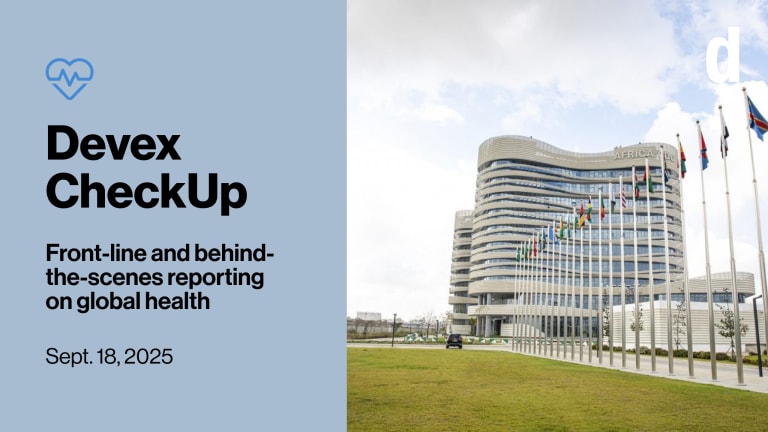Presented by Viamo

The Africa Centres for Disease Control and Prevention has been an institutional bright spot during the COVID-19 pandemic. Now representatives of the African Union have agreed to give Africa CDC more independence and more flexibility to respond to outbreaks and pandemics.
This is a preview of Newswire
Sign up to this newsletter for an inside look at the biggest stories in global development, in your inbox daily.
Also in today’s edition: We look at the World Bank's analysis of rising food costs, and share views about a U.N. resolution on the right to a sustainable environment.
The African Union is celebrating its 20th anniversary this year — though “celebrating” might not be the best choice of words. The AU designated 2022 as its Year of Nutrition, but African countries find themselves on the wrong side of food supply chains due to their dependence on Russian and Ukrainian exports. The continent is also grappling with a rise in violent extremism and an uptick in natural disasters including droughts and flooding, which is leading to a rise in humanitarian crises. Unconstitutional changes in government leadership are also increasing in frequency.
One of the top agenda items at the AU’s midyear coordination meetings in Zambia this weekend was health, and representatives reached agreement on plans to reshape the continent’s health security institutions in the wake of the pandemic.
Last month, my colleague Sara Jerving revealed a brewing turf battle between Africa CDC and the World Health Organization’s regional office — a key sticking point being WHO’s concern over who should have authority to declare a health emergency.
Now Sara reports — citing an Africa CDC spokesperson — that while the final documents on Africa CDC’s revised statutes have not been made public, the up-and-coming agency will have the ability to declare and coordinate health emergencies.
“There's nothing wrong in identifying a regional institution to identify an emerging infection, [and] squash it before it becomes a threat globally,” Dr. John Nkengasong, the former director of Africa CDC, said last week at Devex World.
Read: African Union passed statute giving Africa CDC more independence (Pro)
+ Pro members can read Sara’s deep dive into the agency’s continental response, and its skillful handling of the pandemic. Not gone Pro yet? Start your 15-day free trial.
Meanwhile, the AU’s executive council voted for Rwanda to host the new African Medicines Agency, or AMA, which will help harmonize regulatory systems for medicine. AMA will be the second cross-continental health agency of the African Union, following Africa CDC, which is hosted in Ethiopia. Rwanda was chosen out of a pool of eight candidate countries.
Read: Rwanda chosen to host the African Medicines Agency
When it comes to institutions designated to respond to health emergencies at the national level, not enough African countries are meeting the mark, according to Africa CDC Acting Director Dr. Ahmed Ogwell Ouma.
Only 12 African countries have public health emergency operation centers that function ideally and consistently, Sara reports.
On the continent, 34 countries have dedicated facilities for these centers, 17 countries have legal authorities backing them, 27 countries have the minimum staff required, and 24 have the operations of these centers written in their budget — but only a dozen countries have scored above 80% on the metric the AU is using to define a high functionality.
Read: Africa CDC urges countries to set up centers for health emergencies
+ For more content like this, sign up for Devex CheckUp, the must-read weekly newsletter for exclusive global health news and insider insights.
Out of reach
It’s getting more expensive to eat healthy food.
In 2020, the global average daily cost of a healthy diet was $3.54, up from $3.31 a year earlier, according to the World Bank. That means the cost of a healthy diet is over 50% more than the bank’s extreme poverty line, which sits at $1.90 a day.
“The fact that a person could be considered not poor, according to these poverty lines, but yet be far from able to afford a healthy diet, let alone other essentials, should give us pause,” says Aart Kraay, a chief economist at the bank.
More worryingly, these numbers don’t include the sharp food price spikes occurring this year, Shabtai Gold reports.
World Bank: Healthy diet costs are skyrocketing, reversing gains
ICYMI: Hunger gains on track to be wiped out by 2030 as food insecurity rises
Your next job
My colleague Justin Sablich continues to track the organizations hiring in response to Ukraine’s crisis — and he has a new update with the latest advertised positions.
“We need new staff with experience who can take things forward fast, have an inclusive approach, and can understand and address the specific needs of an older population in a complex emergency,” says Justine Tordoff, head of human resources at HelpAge International.
Learn more: The globaldev organizations hiring in response to Ukraine crisis
+ Check out Devex Career Center where you can explore our job board. You can also start your 15-day free trial of Career Account membership to gain full access to the valuable tools you need to be successful in your globaldev job hunt.
Greenlight
Today the Core Group of States on Human Rights and the Environment — Costa Rica, Maldives, Morocco, Slovenia, and Switzerland — is submitting a draft resolution to the U.N. General Assembly on the right to a clean, healthy, and sustainable environment.
Delfin Ganapin of WWF International and Yolande Wright of Save the Children International argue that not only would this resolution fill a longstanding gap in the international human rights framework but would also trigger greater pursuit of environmental action around the world.
Opinion: The right to a healthy environment for everyone, everywhere
In other news
U.S. President Joe Biden on Saturday committed $1 billion for food security in the Middle East and North Africa at a summit with Gulf leaders. [Reuters]
Ghana has officially confirmed two deaths from the Marburg virus and has quarantined 98 suspected contact cases. [BBC]
The European Investment Bank plans to invest less in road infrastructure in its transport projects as the financial institution moves to adopt climate policies. [Financial Times]
Sign up to Newswire for an inside look at the biggest stories in global development.
Search for articles
Most Read
- 1
- 2
- 3
- 4
- 5








